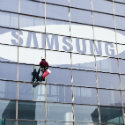
Samsung has cast aspersions on Huawei's pricing strategy in the mobile network equipment market when asked by a UK parliamentary committee if years of unfair competition had driven some firms out of business.
Woojune Kim, an executive vice president at the South Korean vendor, said no company with shareholders that is trying to make a profit would have been able to price equipment at the same level as Huawei, which has been accused by its opponents of receiving unfair support, including financing, from the Chinese government.
"We have frequently seen bids that do not seem to make sense in the pricing," said Kim in response to questions. "No company beholden to shareholders and to make profits could offer that sort of bid."
Kim said the basic electronics costs were "pretty well known" throughout the industry and that Huawei's prices did not look commercially viable based on an assessment of the "raw materials" expenses.
"We create over 500 million things per year and are pretty well versed in what it takes to make products. We were very surprised," said Kim.
"It would not be sustainable for us," he told the committee when asked how long it would take for Samsung to go bust if it tried to match Huawei's prices. "Our shareholders would not be happy."
One of the accusations made against Huawei on a lengthening charge sheet is that it has built its market position in Africa, Europe and parts of Asia by undercutting Western rivals such as Ericsson and Nokia. Firms that once competed in the mobile equipment market, including Alcatel-Lucent and Canada's Nortel, have either collapsed or been swallowed up in mergers.
"There has been brutal competition and you could say that in some cases the prices did not make sense," said Kim. "Companies went into the red and could not sustain business."
He estimates that consolidation has reduced the number of global vendors from more than ten to just three or four "that are viable" in the last 20 years.
Huawei was in the ascendant over much of this period, growing its revenues from just $9.5 billion in 2006 (using today's exchange rate) to $123 billion last year.
In contrast, revenues made by Ericsson rose from $19.4 billion in 2006 to just $24.8 billion last year, a far less dramatic increase.
Huawei overtook its Swedish rival in 2015 to become the world's largest provider of network equipment to communications service providers globally
Courted as a possible 5G alternative to Huawei, Samsung was today being questioned by UK officials considering whether to ban the Chinese vendor after the recent tightening up of US sanctions against it.
The UK's National Cyber Security Centre, a security watchdog, appears worried the US decision will force Huawei to use components that come from Chinese sources, heightening the security risks attached to its products.
Want to know more about 5G? Check out our dedicated 5G content channel here on Light Reading.
For other policymakers, the chief concern is that Huawei will simply not be able to supply UK customers with the products they need beyond the first half of next year, when some analysts have warned it will run out of essential components.
Huawei this week insisted it has the inventory to meet current demands for 5G and fixed broadband networks but has not been able to reassure customers it has a long-term fix in view.
Victor Zhang, Huawei global head of government affairs, today proved resistant to sharing details of the company's different options with the parliamentary committee, despite being repeatedly asked for more information about Huawei's contingency plans.
He also denied links to the Chinese state, insisting Huawei is "100% owned" by its own employees and that only a tiny share is held by Ren Zhengfei, the company's founder. "We are independent of any government including China," he said.
Graham Stringer, a Member of Parliament for the Labour Party, refused to accept the claims about independence. "China is not a state like other states and is centrally controlled and it is not credible that if China wanted Huawei to do something you would have the ability to resist that," he said.
Neither Zhang nor Jeremy Thompson, a vice president of Huawei UK, were prepared to comment on China's recent intervention in Hong Kong when asked for their views.
Related posts:
— Iain Morris, International Editor, Light Reading
About the Author(s)
You May Also Like




_International_Software_Products.jpeg?width=300&auto=webp&quality=80&disable=upscale)







